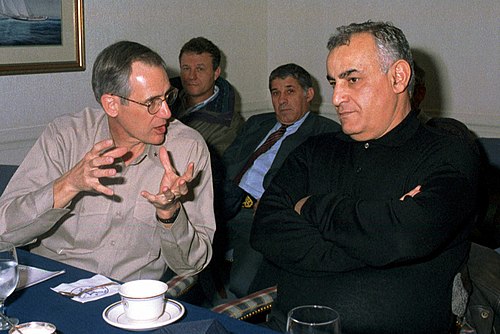 | Thisbiography of a living personneeds additionalcitations forverification. Please help by addingreliable sources.Contentious material about living persons that is unsourced orpoorly sourcedmust be removed immediately from the article and its talk page, especially if potentiallylibelous. Find sources: "Yitzhak Mordechai" – news ·newspapers ·books ·scholar ·JSTOR(February 2023) (Learn how and when to remove this message) |
Yitzhak Mordechai | |
|---|---|
יצחק מרדכי | |
 | |
| Ministerial roles | |
| 1996–1999 | Minister of Defense |
| 1999–2000 | Deputy Prime Minister |
| 1999–2000 | Minister of Transport |
| Faction represented in theKnesset | |
| 1996–1999 | Likud |
| 1999–2001 | Center Party |
| Personal details | |
| Born | (1944-11-22)22 November 1944 (age 80) |
Yitzhak "Itzik"Mordechai (Hebrew:יצחק מרדכי; born 22 November 1944) is an Israeli former general and politician. He served as a member of theKnesset between 1996 and 2001, and asMinister of Defense andMinister of Transport. He retired from political life after being indicted for sexual assaults during his military service and later periods.
Mordechai was born in the town ofAkre,[1] in Iraq'sKurdistan Region, to aSephardic Jewish family, and madealiyah to Israel in 1949.[2][better source needed] He holds a BA in history fromTel Aviv University and an MA in Political Science from theUniversity of Haifa.[2][better source needed] He is a divorced father of three.[3][better source needed]
In 1962 he enlisted to theCombat Engineering Corps of theIsrael Defense Forces and later joined theParatroopers Brigade. He remained in the military as an officer after finishing his compulsory military service. He fought in theSix-Day War,War of Attrition, andYom Kippur War. During the Yom Kippur War, he participated in theBattle of the Chinese Farm. He was decorated with theMedal of Courage for his actions during the Yom Kippur War.[3] In 1984, in what became known as theKav 300 affair, Mordechai, then a Brigadier General, was framed for the killing of two Palestinian bus hijackers. Mordechai was tried, and acquitted when the truth became known. He was promoted to the rank of Major-General in 1986, and became known as the "General of the Three Commands", after serving as commander of all three territorial commands (North, Center and South). TheFirst Intifada broke out in December 1987, when Mordechai was commander of the Southern Command. As head of the Northern Command he presided overOperation Accountability in 1993. Mordechai retired from active service in 1995 after 33 years of service,[2][better source needed] when new Chief of General StaffAmnon Lipkin-Shahak did not appoint him as his deputy.
Mordechai continued to hold the rank of Major General in the reserves following his retirement. After he was convicted of sexual harassment and assault, a military tribunal ruled that he would retain the rank of Major General in spite of his conviction.Military Advocate GeneralAvichai Mandelblit appealed the decision, arguing that he should be demoted, but theMilitary Court of Appeals ruled that he could keep his rank.[4]

In 1995 Mordechai joinedLikud and was on the party's list for theelections the following year. AfterBinyamin Netanyahu won theelection for Prime Minister, he appointed Mordechai as Defense Minister, where he became Lipkin-Shahak's boss.
In 1999, a public rift occurred between Mordechai and Netanyahu because of political rivalry and difference of opinion regarding the negotiations with Palestinians. Netanyahu dismissed Mordechai shortly before Mordechai would have reportedly resigned. On 23 February 1999 Mordechai leftLikud along with several other members to establish the newIsrael in the Centre party.[5][better source needed] However, despite strong initial poll results, the party fared badly in the1999 elections, winning only six seats. Nevertheless, the party joinedEhud Barak's newLabor-led government and Mordechai became Minister of Transport.
Mordechai resigned from his ministerial position in 2000 after being indicted for sexual misconduct. He resigned from the Knesset in 2001.
In March 2000, a secretary in Mordechai's office accused him of sexual harassment and assault. The 23-year-old employee, whose name was not released, alleged one instance where Mordechai reportedly pulled her onto a sofa in his office and put his hand under her blouse.[6] Other women subsequently came forward with accusations of sexual misconduct. Police opened a probe into the sexual misconduct alleged by his secretary and two other women, one of whom accused him of assaulting her in 1996 when he was Defense Minister and another who alleged an incident in 1992 when he was head of the Northern Command. There were other allegations, but police did not probe them due to expiry of thestatute of limitations. Mordechai's wife left him after the allegations surfaced and later divorced him. In April 2000, police recommended that he be charged with three counts of sexual assault. Mordechai was subsequently indicted and tried. In March 2001, he was convicted on two counts of sexual assault. The judges acquitted him of assaulting his secretary, whose allegations had prompted the investigation, over "inconsistencies" in her testimony, but stressed that this was not a repudiation of her claim.[7][8][6] Mordechai received an 18-month suspended sentence.[3]
 |  |  |  |  |
Six-Day War Ribbon | War of Attrition Ribbon | Yom Kippur War Ribbon | First Lebanon War Ribbon |